
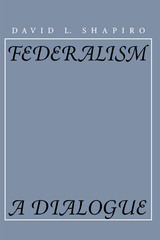

Giving particular attention to intergovernmental working relationships, this revised edition of Federalism and Environmental Policy has been significantly updated to reflect the changes that have taken place since the highly praised first edition. Denise Scheberle examines reasons why environmental laws seldom work out exactly as planned. Casting federal-state working relationships as "pulling together," "coming apart," or somewhere in-between, she provides dozens of observations from federal and state officials. This study also suggests that implementation of environmental policy is a story of high stakes politics—a story rich with contextual factors and as fascinating as the time the policy was formulated.
As four very different environmental programs unfold—asbestos (updated to include the fallout from the World Trade Center), drinking water, radon, and surface coal mining—Scheberle demonstrates how programs evolve differently, with individual political, economic, logistical, and technical constraints. The policy implementation framework developed for the book provides the lens through which to compare environmental laws.
Federalism and Environmental Policy goes beyond the contents of policy to explore the complex web of federal-state working relationships and their effect on the implementation of policy. It is unique in how it portrays the nuts-and-bolts, the extent to which the state and federal offices work together effectively—or not. Examining working relationships within the context of program implementation and across four different environmental programs offers a unique perspective on why environmental laws sometimes go awry.
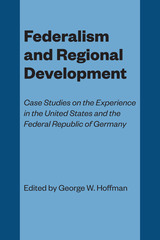
Federalism and Regional Development is the resuit of the first German-American geography seminar, held at the University of Texas in September 1979. The chapters deal with the impact of geographic policy planning by various governmental agencies in both the Federal Republic of Germany and the United States, two countries with federal systems of government. Although various bureaucratic offices at the federal, state, county, and city levels became involved in spatial planning in both countries, no overall coordination of development planning existed. The contributors to this volume offer many theoretical and empirical perspectives on the evolution of federal policies and programs and their impact on geographic planning activities at all levels of government. The topics covered range from actual regional case studies in both countries to the framework of the agencies concerned with spatial planning. Numerous maps and tables document the data resources of the contributors and yield useful insights on the workings of the federal system.
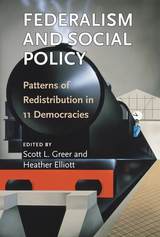

A love for nature and the forest drew Tomas Koontz to develop a keen interest in the workings of public forest management and forest policy. Beyond policy, however, this book is also about the very human issues of federalism, decentralization of control over public lands, citizen participation, and how agency policies, both state and federal, are formulated and exercised.
Federalism in the Forest is the first book to examine and compare public policy performance across both state and national levels, explaining why state agencies excel at economic outputs and profitability, the management of land with state income in mind-while national agencies are stronger in citizen participation and the inarguably important role of environmental protection. Instead of focusing on historical development of federal-state roles or on state officials as affected by national polices, Koontz shows how officials, when given authority, both make and implement policy at the state versus the national level. Although arguments fly about the decentralization of public lands-most often based on ideology-Koontz offers empirical evidence that demonstrates not only that devolution matters, but how.
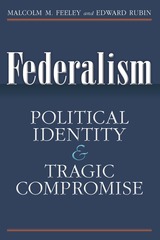
Federalism is one of the most influential concepts in modern political discourse as well as the focus of immense controversy resulting from the lack of a single coherent definition. Malcolm M. Feeley and Edward Rubin expose the ambiguities of modern federalism, offering a powerful but generous treatise on the modern salience of the term.
—Sanford Levinson, University of Texas at Austin
“At last, an insightful examination of federalism stripped of its romance. An absolutely splendid book, rigorous but still accessible.”
—Larry Yackle, Boston University
“Professors Feeley and Rubin clearly define what is and is not federal system. This book should be required for serious students of comparative government and American government.”
—G. Ross Stephens, University of Missouri, Kansas City
“Feeley and Rubin have written a brilliant book that looks at federalism from many different perspectives—historical, political, and constitutional. Significantly expanding on their earlier pathbreaking work, they have explained the need for a theory of federalism and provided one. This is a must read book for all who are interested in the Constitution.”
—Erwin Chemerinsky, Duke University School of Law

Conventional wisdom holds that programs for the poor are vulnerable to instability and retrenchment. Medicaid, however, has grown into the nation’s largest intergovernmental grant program, accounting for nearly half of all federal funding to state and local governments. Medicaid’s generous open-ended federal matching grants have given governors a powerful incentive to mobilize on behalf of its maintenance and expansion, using methods ranging from lobbying and negotiation to creative financing mechanisms and waivers to maximize federal financial assistance. Perceiving federal retrenchment efforts as a threat to states’ finances, governors, through the powerful National Governors’ Association, have repeatedly worked together in bipartisan fashion to defend the program against cutbacks.
Financing Medicaid engagingly intertwines theory, historical narrative, and case studies, drawing on sources including archival materials from the National Governors’ Association and gubernatorial and presidential libraries, Centers for Medicare and Medicaid Services data, the Congressional Record, and interviews.
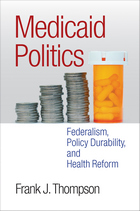
Medicaid, one of the largest federal programs in the United States, gives grants to states to provide health insurance for over 60 million low-income Americans. As private health insurance benefits have relentlessly eroded, the program has played an increasingly important role. Yet Medicaid’s prominence in the health care arena has come as a surprise.
Many astute observers of the Medicaid debate have long claimed that “a program for the poor is a poor program” prone to erosion because it serves a stigmatized, politically weak clientele. Means-tested programs for the poor are often politically unpopular, and there is pressure from fiscally conservative lawmakers to scale back the $350-billion-per-year program even as more and more Americans have come to rely on it. For their part, health reformers had long assumed that Medicaid would fade away as the country moved toward universal health insurance. Instead, Medicaid has proved remarkably durable, expanding and becoming a major pillar of America’s health insurance system.
In Medicaid Politics, political scientist Frank J. Thompson examines the program’s profound evolution during the presidential administrations of Bill Clinton, George W. Bush, and Barack Obama and its pivotal role in the epic health reform law of 2010. This clear and accessible book details the specific forces embedded in American federalism that contributed so much to Medicaid’s growth and durability during this period. It also looks to the future outlining the political dynamics that could yield major program retrenchment.
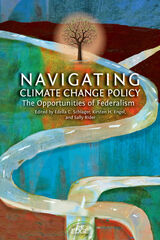
Federalism—the system of government in which power is divided among a national government and state and regional governments—is well-suited to address the challenges of climate change because it permits distinctive policy responses at a variety of scales. The chapters in this book explore questions such as what are appropriate relationships between states, tribes, and the federal government as each actively pursues climate-change policies? How much leeway should states have in designing and implementing climate-change policies, and how extensively should the federal government exercise its preemption powers to constrain state activity? What climate-change strategies are states best suited to pursue, and what role, if any, will regional state-based collaborations and associations play? This book examines these questions from a variety of perspectives, blending legal and policy analyses to provide thought-provoking coverage of how governments in a federal system cooperate, coordinate, and accommodate one another to address this global problem.
Navigating Climate Change Policy is an essential resource for policymakers and judges at all levels of government who deal with questions of climate governance. It will also serve as an important addition to the curriculum on climate change and environmental policy in graduate and undergraduate courses and will be of interest to anyone concerned with how the government addresses environmental issues.
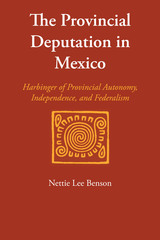
Mexico and the United States each have a constitution and a federal system of government. This fact has led many historians to assume that the Mexican system of government, established in the 1820s, is an imitation of the U.S. model. But it is not.
First published in Spanish in 1955 and now translated by the author and amplified with new material, this interpretation of the independence movement tells the true story of Mexico's transition from colonial status to federal state. Benson traces the Mexican government's beginning to events in Spain in 1808–1810, when provincial juntas, or deputations, were established to oppose Napoleon's French rule and govern the provinces of Spain and its New World dominions during the Spanish monarch's imprisonment.
It was the provincial deputation, not the United States federal system, that provided the model for the state legislative bodies that were eventually formed after Mexico won its independence from Spain in 1821. This finding—the result of years of painstaking archival research—strongly confirms the independence of Mexico's political development from U.S. influence. Its importance to a study of Mexican history cannot be overstated.
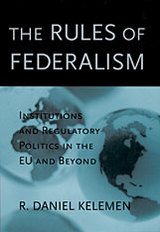
This book examines patterns of environmental regulation in the European Union and four federal polities--the United States, Germany, Australia, and Canada. Daniel Kelemen develops a theory of regulatory federalism based on his comparative study, arguing that the greater the fragmentation of power at the federal level, the less discretion is allotted to component states. Kelemen's analysis offers a novel perspective on the EU and demonstrates that the EU already acts as a federal polity in the regulatory arena.
In The Rules of Federalism, Kelemen shows that both the structure of the EU's institutions and the control these institutions exert over member states closely resemble the American federal system, with its separation of powers, large number of veto points, and highly detailed, judicially enforceable legislation. In the EU, as in the United States, a high degree of fragmentation in the central government yields a low degree of discretion for member states when it comes to implementing regulatory statutes.

For most of the history of the United States, citizens and elected officials alike considered elementary and secondary education to be the quintessential state and local function. Only in the past four decades, from Lyndon B. Johnson's signing of the landmark Elementary and Secondary Education Act of 1965 to George W. Bush's ambitious but controversial "No Child Left Behind" initiative, has Washington's influence over America's schools increased significantly. Today, many Americans have become more convinced that the U.S. government and the states should play an increasingly important role in the nation's schools.
In School's In, Paul Manna looks over forty years of national education policymaking and asserts that although Washington's influence over American schools has indeed increased, we should neither overestimate the expansion of federal power nor underestimate the resiliency and continuing influence of the states. States are developing comprehensive—often innovative—education policies, and a wide array of educational issues have appeared on the political agenda at the state and national levels.
Manna believes that this overlap is no accident. At the core of his argument is the idea of "borrowing strength," a process by which policy entrepreneurs at one level of government attempt to push their agendas by leveraging the capabilities possessed by other governments in the federal system. Our nation's education agenda, he says, has taken shape through the interaction of policy makers at national and state levels who borrow strength from each other to develop and enact educational reforms.
Based on analyses of public laws, presidential speeches, congressional testimony, public opinion, political advertising, and personal interviews, School's In draws on concepts of federalism and agenda-setting to offer an original view of the growing federal role in education policy. It provides insights not only about how education agendas have changed and will likely unfold in the future, but also about the very nature of federalism in the United States.
READERS
Browse our collection.
PUBLISHERS
See BiblioVault's publisher services.
STUDENT SERVICES
Files for college accessibility offices.
UChicago Accessibility Resources
home | accessibility | search | about | contact us
BiblioVault ® 2001 - 2024
The University of Chicago Press









